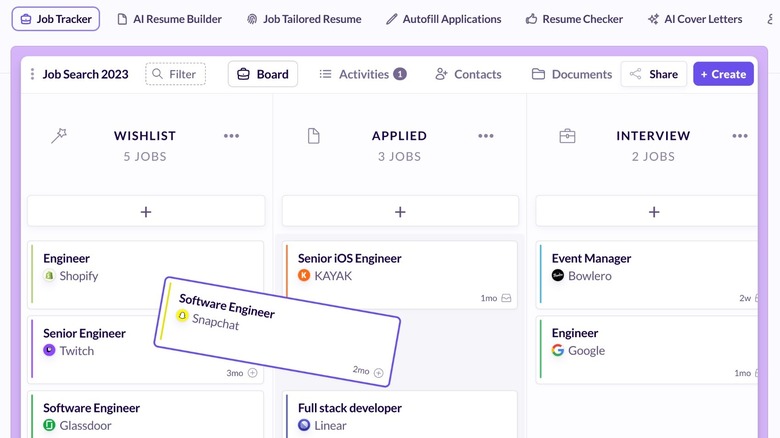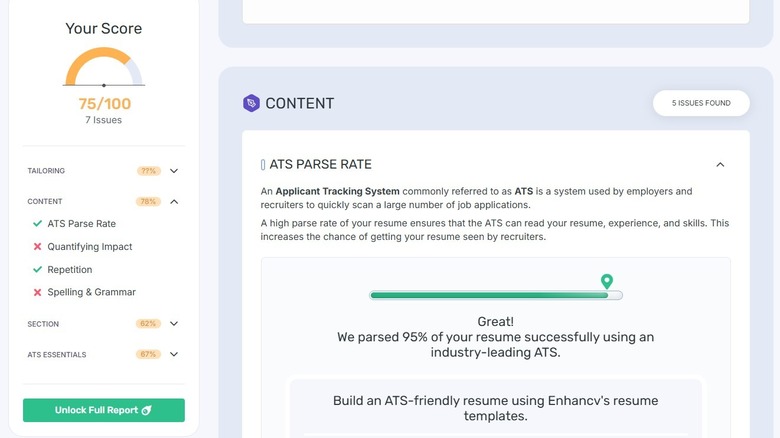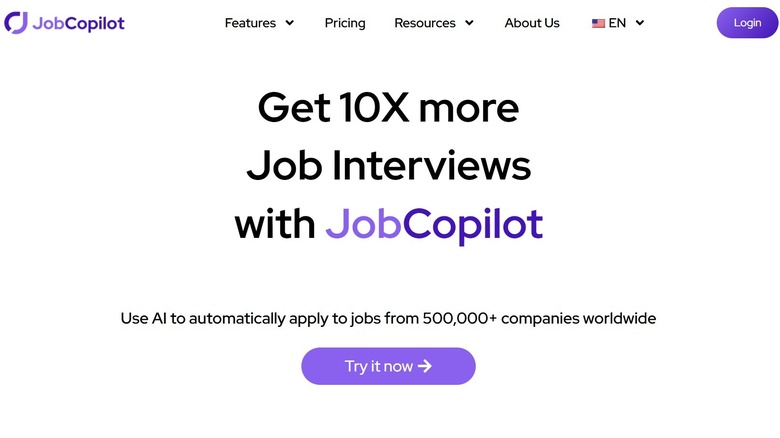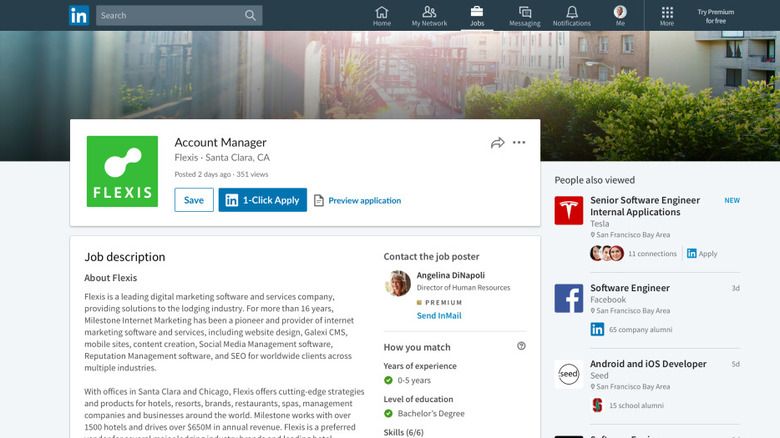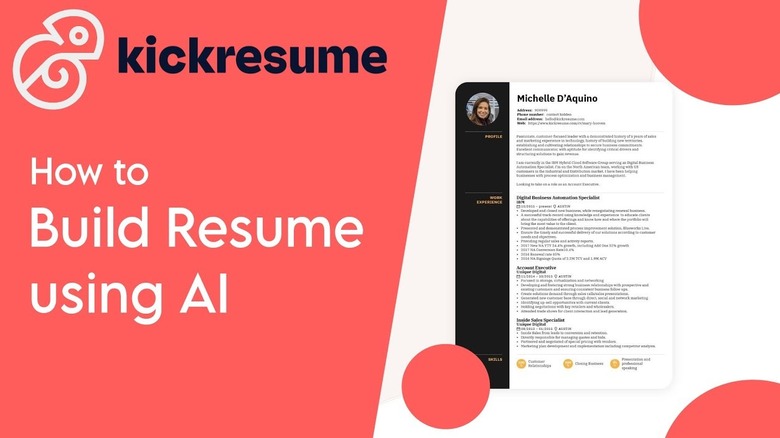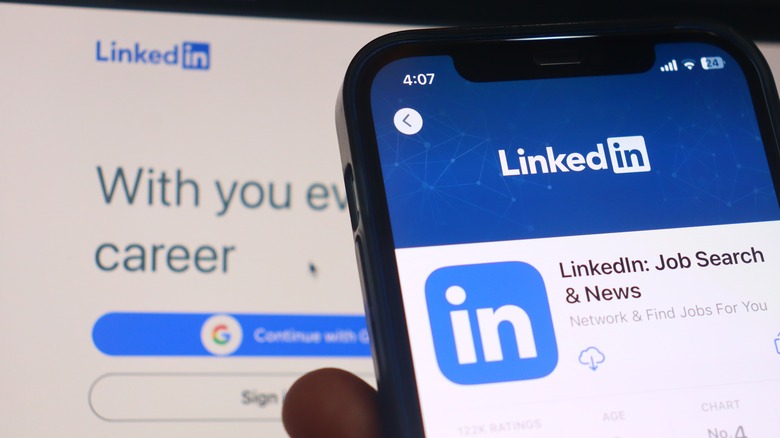5 Of The Best AI Tools For Applying To Jobs, Ranked
Finding a new job might be the most stressful part of adulting. No matter your motivation for a job switch, sifting through job postings, writing cover letters, and tailoring your resume 20 times over can become an energy suck. While we'd argue that AI can't replace humans — and there's some data you may not want to share with large language models — it's hard to deny how much AI is involved in every aspect of your career goals.
From experiencing AI interviews to getting auto-reject emails from chatbots, job seekers can easily see how AI is shaping everything around us. The good news is that AI can also support your job search, although there are some inherent risks to heading down the job bot path. While plenty of great tools offer help with matching your resume to job postings, enhancing your resume, and more, using AI for job applications is an at-your-own-risk kind of endeavor.
In some cases, issues like chatbots hallucinating may be the least of your worries, especially if the companies you're applying to have unseen methods of filtering out AI-assisted applications. Keeping the risks in mind, both in terms of sharing your personal information with AI apps and trusting your career to them, here are some of the best AI tools for applying to jobs, ranked from helpful to most helpful.
The following list was researched and selected in part courtesy of the writer's half-decade of experience working in human resources for a digital startup — as well as a variety of factors that are laid out in the Methodology section of this article below.
Huntr
While AI can auto-apply to jobs with your pre-filled application information, not all tools offer a running list of applications. If your primary goal in adding artificial intelligence to your job search is staying organized, you'll want to explore application-tracking AI tools.
For example, Huntr's job tracker function gives you a wishlist option and categorizes your applied-for jobs automatically. It even saves the job descriptions, salaries, and associated documents so you can reference the info later. There's also a built-in resume tool, so you can manage all your various resume versions and pick the best option for each role. Finally, there's an activity tracker that illustrates your journey from application to — hopefully — a job offer.
Other application-tracking AI tools like LuckyKoi, a Chrome extension, can also help you manage your job search without the need for clunky manual data entry. However, Huntr is our recommendation because it's a broader app with more functions, and the free version lets you track up to 100 jobs and includes insights, templates, and other advanced features.
Enhancv
If you've been perusing the job market for a while, you've probably realized that many companies, faced with a flood of applications, use AI or other tools on their end, too. One tool that has long been part of the job application process is an ATS (Applicant Tracking System). If your resume is not compatible with these systems, you're out of luck before a human ever knows you've applied.
When I worked in Human Resources for a digital startup, I sometimes received resumes that looked like a Picasso painting, and not in a good way. Using an ATS resume checker is a good way to double-check that your beautiful formatting won't turn ugly once it's potentially chewed up by a submission system. While the company I worked for didn't have an auto-reject feature at the time, you could run into programs that trash your resume if it doesn't meet ATS specs, so ticking all the formatting boxes is an important first step.
Enhancv's ATS resume checker looks for things like length, bullet point usage, unreadable formatting features, and word repetition, among other things. I fed it my resume and got some helpful results, though some are hidden behind a paywall, and others were false flags, such as spelling errors that were actually company names. The full ATS check with Enhancv requires a paid plan of around $17 per month. Other options for ATS checking include Kickresume, KudosWall, Resume Genius, Mployee.me, Weekday.works, and Wobo AI.
JobCopilot
If you can't stomach the thought of manually filling out yet another job application, you might find JobCopilot to be one of the best AI tools for applying to jobs. AI auto-applications can make the process easier because there's far less effort involved, especially with JobCopilot. The selling point of this tool is that you answer screening questions one time, and then the tool does the work for every application thereafter.
However, this is another AI tool that's not without its drawbacks. One potential concern with AI auto-apply tools is that, because it is artificial, AI does not have sentience or agency and subjectivity. Thus, you might wind up applying for jobs that don't make sense for your career goals. AI can also be discriminatory in some situations, whether on the application or the hiring side of things, so it's tough to put full confidence in it to find you your dream job.
That said, if application volume is on your must-have list, JobCopilot may be a tool you'll want — although it will cost you around $9 per week. Or, you can try other tools, like AIApply, AutoApply Jobs, Bulk Apply, Careerflow, and Talentprise, which offer similar application functions.
LinkedIn Job Match AI
If you use LinkedIn regularly, you've likely noticed that there are many AI features on LinkedIn, including tools that may aid in your job search. SlashGear writer Emma Street found that not every AI tool was helpful, but job matching was the most consistently useful component.
In early 2025, LinkedIn rolled out job-match AI, which compares your experience to open job postings. At the least, the tool may help you gauge whether it's worth applying to a job, based on your qualifications. Diving deeper, the AI tool gives details on job matches, so you get more insight. The only drawback? The job matching feature is currently only available for Premium LinkedIn users. While LinkedIn doesn't list a per-month price for Premium for job seekers (instead, it offers a free trial with no mention of cost), when I went through the sign-up steps on my rarely used account, it stated a base price of $39.99 per month after the one-week free trial.
If you're not on LinkedIn or want to try another job matching tool (and possibly a different price point), some popular names include Arytic, AutoJob, Career.io, ResumeNerd, Sonara, and Talentprise.
Kickresume
As someone who has been on both sides of the job application scenario — as a former Human Resources manager and a former resume writer-for-hire — scanning your resume to make sure it matches the job post is a helpful first step. Taking suggestions from a resume optimization tool is the logical next step, and it could help you get a foot in the door. Thus, resume optimization AI tools could be one of the best options for applying to jobs. Tools like Kickresume let you build an entire resume with AI, or you can pick and choose what suggestions to accept from it or other tools.
In an era where even trusting AI with your email might be a time-wasting move, it's probably not ideal to hand your entire resume to an AI tool. However, there's a difference between using an AI resume optimization tool versus having a tool write the entire resume for you. After all, some of the strongest AI detection tools could prevent hiring managers from taking your resume seriously if you have it written entirely by AI.
That said, Kickresume and tools like Enhancv, Huntr, SkillSyncer, and Teal offer functions that optimize your resume based on job posting match, ATS compatibility, format/visual appeal, specific and relevant experience, and career accomplishments, among other things. An AI-optimized resume could be worth the risk if it helps you get past initial screenings and into an interview.
Methodology
Our methodology for choosing the best AI tools for applying to jobs started with the theory that the least helpful of the best are those that address only one part of the job search process. For example, since tracking your job applications is one small piece of the puzzle, that tool is technically the least of the best. Similarly, ATS checkers are another minor part of the job application process that can nonetheless be important in actually getting your resume seen.
Although JobCopilot streamlines the application process, it's not our favorite AI job application tool because we're not entirely sure that AI can address all the nuances of open roles and qualifications. That said, it may work for many applicants and can help you throw everything at the wall to see what sticks. Our last two picks are edging into nearly invaluable territory: LinkedIn is a widely used career platform, and its built-in AI makes applying for jobs with confidence a lot simpler.
Finally, Kickresume is the best AI tool for applying to jobs because it optimizes your resume — something that you should be doing anyway, but might not know how (or have the patience) to DIY. Keep in mind our grain-of-salt caution about using AI, but consider that an AI-powered career coach might be more useful than you expected.

